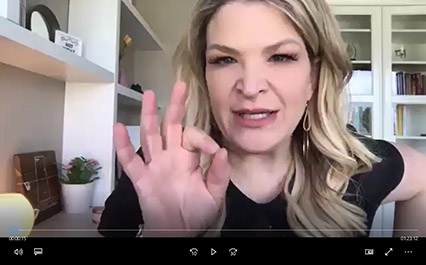Page Content

Teachers, take heart. Loosen your shoulders. Let the pedagogy simmer on the back burner for a few minutes. Your most important job right now is to sit back and see your students.
That was the message given to more than 800 Alberta teachers by psychologist Jody Carrington in a webinar on Saturday, May 9.
“I have not met an educator who doesn’t have a heart the size of Texas,” Carrington said as she acknowledged that the COVID-19 measures, including the sudden shift to online learning and not being able to see their students in person, were wreaking havoc on teachers’ confidence.
But the kind of connection that students need right now is the kind that teachers are wired to facilitate, Carrington said, and even though the pandemic is putting physical distance between teachers and students, the opportunity for emotional connection has never been more alive.
“You don’t get into this business because you love Bunsen burners. If I take you back to the beginning of this, so many people say ‘I love kids,’ ‘I want to make a difference,’ ‘I want to give back to the world.’”
In other words, the most important part of a teachers’ job isn’t pedagogy.
“Our job is to impart the wisdom of emotional regulation,” Carrington said, “and this is particularly true when we don’t have a script.”
Helping children emotionally regulate starts with simply seeing the child in front of you.
Earlier in Carrington’s career, when she would visit schools and help staff work with difficult children, the children’s files would be thick and full of acronyms.
“[The child] will have a litany of diagnoses,” she said, along with multiple IPPs, with the school staff saying that the child spits, hits or draws pictures of bombs.
During every school visit, Carrington would close the file, look at the staff, thank them for their good work then get down to the important questions.
“What level is he on Fortnite? What’s his favourite colour? Where’s his mama? When was the last time he saw his dad?”
The process was magical.
“If I have people start to answer those questions, you can watch the kid’s file [go down in size]. The only way for kids to get regulated is they have to be seen,” Carrington said.
For a child to be seen, their emotions need to be validated. That means listening without trying to fix.
“The number one thing we have to do [with big emotions] is feel it,” she said.
And to hold space for feelings, we have to explore them. When we start to feel ourselves looking for solutions instead of letting children talk, we can reset the trajectory with three words: “tell me more.” Ask them what the hardest part is, ask them what they miss.
The next aspect of connection is making sure we’re taking care of ourselves, but Carrington suggests framing it as self-growth instead of self-care. She said rather than the oft-touted self-care activities such as long baths and fancy moisturizers, it’s the self-growth activities such as cultivating gratitude, moving our bodies and choosing to limit our news consumption that make the biggest difference in how we’re able to show up for the children in our lives.
And when teachers feel like they can’t handle the strangeness of online learning or are having difficulty connecting with faces on a screen, they need to go back to the beginning of their careers, to the reason they wanted to be a teacher in the first place. She said that desire to connect will get teachers through the pandemic, and that will get our children through it.
“There’s nothing wrong with Bunsen burners,” she said. “However, they’re not your conduit to magic.” ❚
|
View the video
The video of Carrington’s talk is available on the ATA website: teachers.ab.ca > My ATA > Members Only.
Watch the ATA’s social media channels for details.
|
